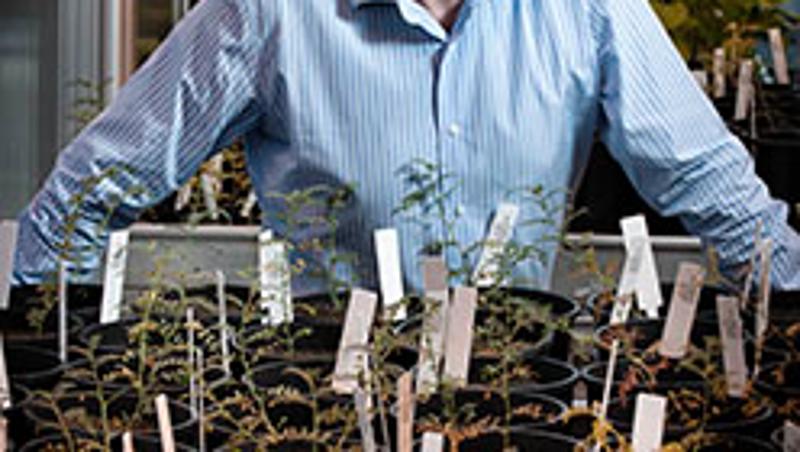
One of the world's leading discovery researchers has moved to QUT to work with the university's plant genetic scientists to help solve one of the most baffling problems facing the genetic improvement of food plants.
Professor Peter Waterhouse is a molecular whisperer, recognised internationally for his research into gene silencing and plant viruses. He and his small team of scientists discovered how to trigger a naturally occurring pathway in plants that fights viruses and switches off genes.
"There is valuable work being conducted at QUT and at other key institutions around the world with the aim of transferring beneficial nutrients and other characteristics to staple food crops such as bananas, chickpeas and other pulses, rice and maize," he said.
"However, a real problem is that the newly introduced genes often get switched off by the plant. Somehow the plant knows the difference between 'self' and 'non-self'.
"If we can provide the new genes with 'certificates of authenticity' so that the plant accepts them as 'self', we will not only reduce the time it takes to successfully improve an array of staple crops but also have confidence that the new genes are operating at their maximum efficiency and in harmony with the rest of the plant.
"If we can work gently with the plant's genes to have them accept the new modification we will be able to drastically reduce the time it takes to successfully improve an array of staple crops essential to world food security.
"Knowing the keys that start and direct the pathway, and the enzymes that power it, we aim to persuade plants to embrace the genes we introduce for beneficial modification," Professor Waterhouse said.
Professor Waterhouse has taken up a position at QUT's Centre for Tropical Plants and Biocommodities where significant work is being undertaken to develop hardier, more drought tolerant varieties of tropical pulses such as chickpeas and mungbean as well as rice.
The Centre's flagship research is the Bill and Melinda Gates Foundation funded cooking banana project led by Centre director Distinguished Professor James Dale.
A staple crop throughout many east and west African nations, cooking bananas and plantains are great sources of starch but lack other vital micronutrients but Professor Dale and his team have found ways to enrich the fruits with pro-vitamin A and soon iron.
Each year up to 670,000 children die and a further 300,000 suffer blindness from vitamin A deficiency. But with the data from human trials in the United States set for release mid-year, the project will reach a major milestone and over the next three years an elite line of banana plants will be selected from field trials in Uganda.
The quality of the research is such that the Government of India is now partnering with Professor Dale to develop iron-enriched bananas to provide better nutrition to poor, vegetarian communities and also help stem the number of women hemorrhaging to death in childbirth as a result of iron deficiency.
Professor Dale said Professor Waterhouse's research potentially meant genetic scientists would be able to take their nutrient-enriched or drought-tolerant crops to those who needed them, much sooner than is currently the case.
"Our research will make a real difference to people in some of the poorest nations in the world and the sooner we can get it to them the better," Distinguished Professor James Dale said.
Professor Waterhouse said that this research has applications and insights for medical science as all living things have the silencing pathways in their cells. Another spin-off from the research is the ability to vaccinate plants against newly emerging viruses before they spread widely to threaten food security.
Educated at the universities of Newcastle upon Tyne, Cambridge and Dundee in the United Kingdom, Professor Peter Waterhouse was elected a fellow to the Australian Academy of Science in 2009 and comes to QUT from the University of Sydney where he was a Federation Fellow. He has been a chief research scientist at CSIRO and has won a string of prestigious scientific research awards including:
•2007 Prime Minister's Prize for Science (with Dr Ming Bo)
•2007 Winner of The Bulletin's Smartest Scientists in Australia
•2005 CSIRO Chairman's Medal
•2003 IMTC-ISI/Thomson Most Highly Cited in Field Award
•2002 Victor Chang Medal
Media contact: Rose Trapnell, QUT media team leader, 07 3138 2361 or 0407 585 901 rose.trapnell@qut.edu.au


